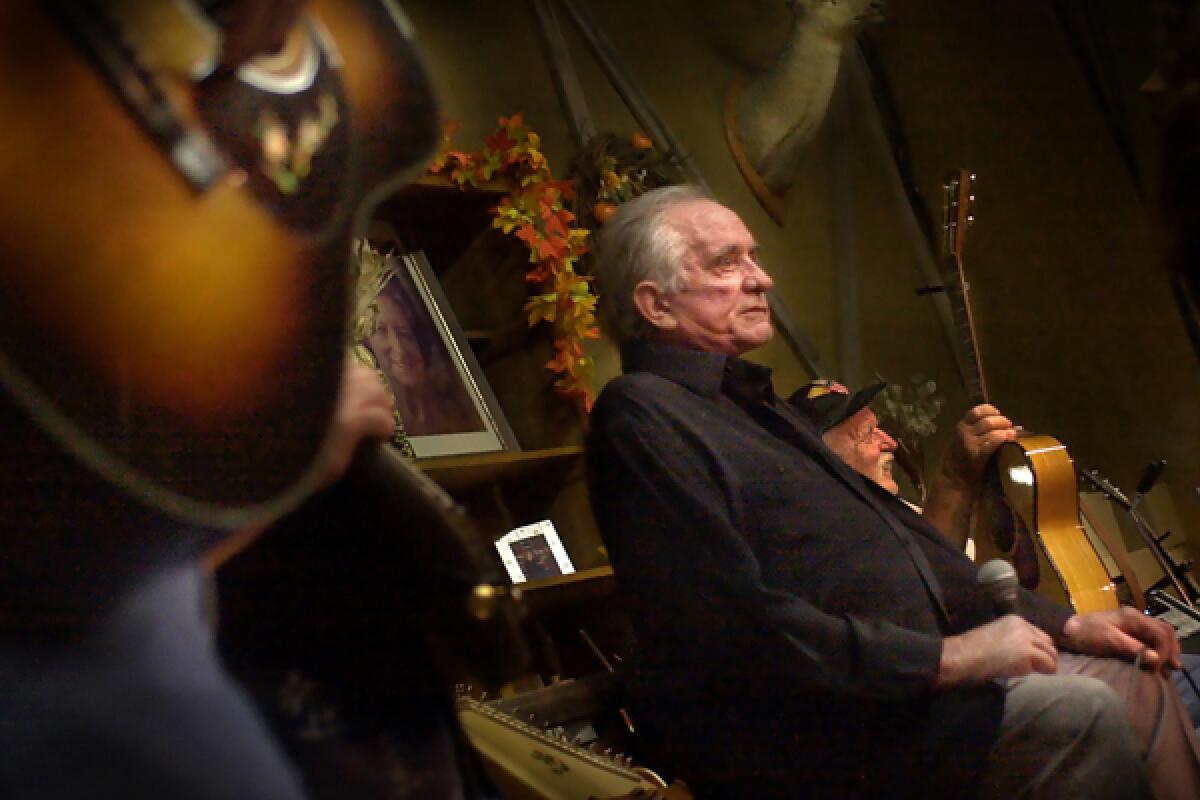Johnny Cash (2002): At home and at peace

Maces Springs, Va. -- John R. Cash was born Feb. 26, 1932, which means a recent Saturday was somewhere around his 25,800th day on Earth. That he spent most of that day in a modest, two-story wood-frame house in a quiet Virginia valley says a lot about the country music pillar and the historic locale.
Cash and his wife, June Carter Cash, own glamorous estates in Nashville and Jamaica, but they find special comfort in the beauty and tradition of this house and this unspoiled valley, both of them the home to country musicâs hugely influential Carter Family.
âIt comes down to solitude and peace of mind,â Cash says, sitting in a rocking chair on the front porch. âThatâs something we cherish now. The phone rarely rings up here.
âWe bought this place in the early â80s. June grew up here, and it has always been her dream to come back here. We make it a couple of times a year. I wish we could make it more.â
It was the inspired mountain music of the Carter Family -- A.P., Sara and Maybelle -- that helped lay the foundation for modern country and bluegrass music in the 1920s. As a boy in Dyess, Ark., Cash heard such Carter Family tunes as âKeep on the Sunny Sideâ and âWabash Cannonballâ on the radio, and he dreamed of being a singer himself.
Cash has lived that dream for nearly half a century. Heâs done more than anyone since Hank Williams to raise the artistic level of country music, thanks to his blue-collar tales of human desire and redemption. Hailed as an influence by everyone from Bob Dylan to Bono, he has been voted into the country music, rock ânâ roll and songwriter halls of fame.
Over the years, the Man in Black, as he is known for his trademark garb, has spent close to 8,000 of his days on tour.
But those days are long behind him. The years have been hard on Cash, a hellion in his younger days who battled a fierce amphetamine addiction.
Many assumed Cashâs music career was over six years ago when doctors told him that he had a rare, life-threatening neurological disorder, but the singer didnât give up. He has recorded three more albums, two of which won Grammys. The third will be released Nov. 5.
Even after learning in 2000 that the diagnosis was false, he has continued to suffer from failing health. Cash has been hospitalized several times for pneumonia, once spending nearly two weeks in a coma. Glaucoma robs him of much of his eyesight, causing a sometimes unsteady gait. Asthma leaves him short of breath, requiring him to take rests during recording sessions.
But his mind remains sharp, and his love of music is still intense.
âMusic is part of my life every day,â says Cash, who is warm and surprisingly shy for someone who has been in the spotlight for so long. âItâs hanging around every morning; sometimes it is with me at night. June says I was singing a song all last night in my sleep. She had to shake me.â
Cashâs voice breaks. âItâs the asthma,â he says as he reaches for a glass of water and tries to catch his breath.
In the evening, the Cashes head down the road for a guest appearance at a weekly barn dance sponsored by descendants of the Carter Family. Admission at the informal 1,000-capacity amphitheater is just $4 for adults, and the seating is first-come, first-served. The building has a homespun touch, with fans sitting on old school bus seats, church pews and movie theater chairs.
Itâs the only place Cash performs these days. Janette Carter, Juneâs cousin, doesnât advertise his appearances because she doesnât want to put pressure on him if he doesnât feel up to performing. But word has spread through the county that Cash is appearing, and thereâs an overflow crowd.
Itâs an older audience, and most have followed Cashâs music for years. The room explodes with cheers when he takes the stage, and for a moment the magic is back. Joined by a three-piece band, Cash opens with âFolsom Prison Blues,â and his rich, deep voice is as strong as the original recording:
I hear the train a-cominâ
Itâs rollinâ round the bend.
And I ainât seen the sunshine
Since I donât know when.
Iâm stuck in Folsom prison
And time keeps dragging on ...
Cash isnât a great singer technically, but heâs a superb communicator whose almost conversational vocal style captures lifeâs everyday search for comfort and salvation with uncommon warmth and conviction. Even in the most joyous tunes, however, his instrumental sound tends to be stark, as if reminding us of lifeâs accompanying hardships.
There are flamboyant touches in his recordings (the mariachi-like horn lines in âRing of Fireâ), but the trademark sound is a âchicka-boom-chickaâ guitar approach (pioneered by the late Luther Perkins) that is as steady and self-affirming an amplified heartbeat. His music is drawn equally from blues, gospel, traditional country and folk -- woven together, in such songs as âFolsom Prison Bluesâ and âI Walk the Line,â into a rich tapestry of Americana.
Cash also navigates nicely through Kris Kristoffersonâs âSunday Morning Coming Down,â but the shortness of breath shows in places on âSupper-Time,â an obscure country song he recorded in 1958.
Most of the fans are too excited to notice when he misses a word here and there, but June, looking for any sign of difficulty, sees whatâs happening and takes the stage at the end of the number, giving her husband a rest. After a few minutes, heâs back by her side, joining her in a duet, and the voice has regained its power. The crowd roars again.
A trademark greeting
There are no address markers identifying Cashâs house, so what you have to do is just turn into one of the long driveways that leads from the old two-lane road, knowing that if the house doesnât belong to Cash it will surely be a relativeâs. Everyone in the area about 15 miles from the Tennessee border seems to be a Carter cousin of some sort.
The Cashesâ house is on a slope at the base of Clinch Mountain, which means you canât see the faces on the porch from the driveway below. But the deep, familiar voice tells you immediately that youâve found the right place.
Hello, Iâm Johnny Cash.
Well, he really only says, âHelloâ; your mind fills in the rest of the line that Cash used thousands of times to open his concerts and his national TV show.
The greeting was as much Cashâs trademark as his solid shock of black hair and his black shirt and pants the cotton farmerâs son wore as a symbol of support for the downtrodden and oppressed. But his hair is now white, and heâs relaxing in a khaki shirt-jacket and gray slacks.
For anyone who remembers his rugged good looks and confident aura, it takes a moment to adjust to the vulnerability that age has brought. But Cash makes it easy to get past appearances.
A deeply religious man, heâs too aware of his many blessings to complain about any physical ailments. Besides, in this idyllic valley whose Shell station is the only sign of commercial intrusion, itâs hard to be downcast about anything.
Cash loves the purity of the mountain music handed down by the Carter Family, and he feels in touch with that tradition in Maces Springs. He returns here for cleansing the way some people might turn to the hot desert air or mineral baths.
After a breakfast of ham, biscuits, scrambled eggs and three types of homemade jelly prepared by the coupleâs two housekeepers, Cash is tired and lies down for a morning nap.
June, energetic at 73, uses the time to show off the valley. Behind the wheel of the coupleâs Lincoln sedan, she points out the places where members of the Carter Family went to school or fished. She even takes me to the local cemetery to see the graves of A.P. and Sara Carter, the husband and wife who formed the trio with Juneâs mother, Maybelle. The wording on their tombstones includes the title of their most famous song, âKeep on the Sunny Side.â
As June, who sang with her mom and sisters in a version of the Carter Family for years and who is a Grammy-winning recording artist now working on a new collection, heads back to the house, she marvels at how the area has retained its character.
âI loved this place, but I also felt there was more outside of these mountains and I was going to see it,â she says. âI went to New York to study acting, but I eventually went back to music. I remember first hearing Johnny Cash on the radio, and he sounded so lonesome. It reminded me of something deep inside of me. It was like there was a piece missing in both of us, and God put us together and made us whole.â
By the time June gets back to the house, Cash is refreshed and wants to play a tape with some rough vocals of the black gospel songs he is thinking about including on his next album. When the tape ends, Cash picks up an acoustic guitar and starts singing some more songs in a similar style, and his voice is straight and true.
âAs long as I can make records, Iâm fine,â he says, setting down the guitar. âAfter all the years, I donât really miss the road. You know what a big fun day for me is now? Itâs when June gets up and weâre both feeling good and we want to go shopping. Weâll go to Wal-Mart and Iâll get one of those electric carts and just race through the aisles. Imagine that being the highlight of your day.â
Still, isnât he looking forward to going on stage in a few hours?
He looks up and smiles, âYou bet.â
Fans lend him a hand
At the barn dance that night, the Cashes take a seat in the audience after their set to watch the other musicians. Fans surround them, eager to shake their hands or get an autograph. After one song they retreat backstage for a few more minutes before leaving the building.
In the â60s Cash was one of the most charismatic performers in pop music -- prowling the stage with the nervous energy of a caged animal. He looked so tough and unapproachable that fans used to step out of his way as he moved about backstage. After all, he did sing in âFolsom Prison Bluesâ about shooting a man in Reno âjust to watch him die.â
As he heads down the amphitheater steps on this night, however, several admirers step forward, helping steady him.
By the time I join them at their house a few minutes later, June is wearing her robe and eating some corn bread and milk. John is in a chair opposite her, looking tired. Heâs got cookies and milk on a tray in front of him.
Heâs not happy with his performance, and it brings out some of the vulnerability that he hadnât shown earlier in the day, when he spoke about the gospel album as if it were a foregone conclusion he would make it.
Now he admits heâd worried that his upcoming album might be his last. He wasnât pleased with some of his vocals on it, and he wondered if his producer Rick Rubin was losing patience working with him. The last two albums may have won Grammys, but they didnât sell much -- a tiny fraction of Rubinâs albums with the Red Hot Chili Peppers and other rock groups.
âI had just finished my last vocal for the record and I shook hands with Rick and I said, âItâs been fun.â I think it was my way of saying I understood if he wanted to call it quits.
âBut he immediately asked what I wanted to do next. I mentioned the black gospel album, and then I mentioned an album of songs that would show my musical roots, and Rick said, âLetâs do them both.â I was dumbfounded. It was just what I wanted to hear. I had thought I might finally be at the point where I would only be singing for myself.â
Taking a bet, and winning
Itâs a sad image, but Cashâs story again is his way of extolling his blessings. After all, he still gets to make records.
Earlier in the day, Cash had told another story, one that perhaps best summarizes his feelings about all that has happened to him.
Back in 1970, Cash took Michael Nesmith, of the Monkees, on a tour of his lavish new house on Old Hickory Lake outside Nashville.
âWe looked at the house and Michael said, âIâm glad for you. Shame you canât keep it.â I asked what he was talking about and he said, âWe canât keep things like that in this business. My bet is youâll lose this place and this woman because the business is awfully rough and youâre as vulnerable as anybody else.â â
Cash pauses.
âI knew what Michael was saying, but I told him Iâd take that bet, and you know what? I won.â
More to Read
The biggest entertainment stories
Get our big stories about Hollywood, film, television, music, arts, culture and more right in your inbox as soon as they publish.
You may occasionally receive promotional content from the Los Angeles Times.










